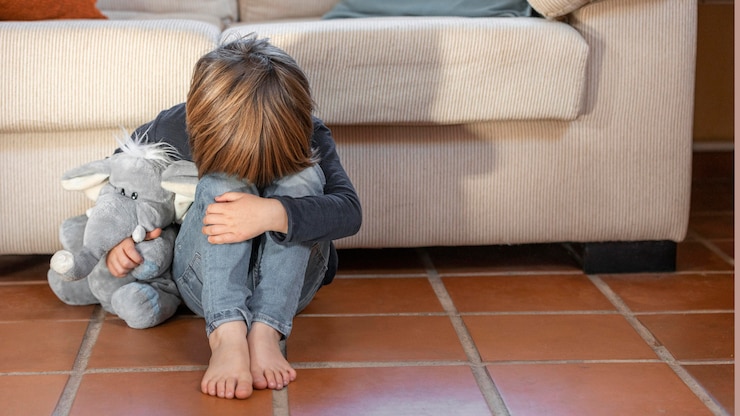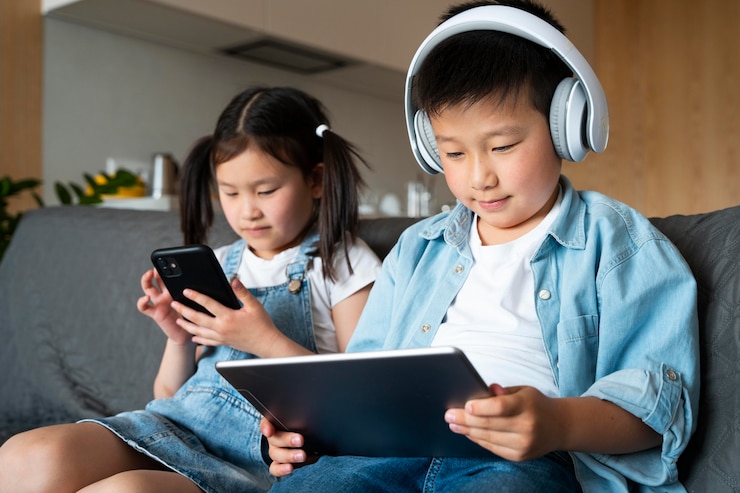
Anxiety in children can begin to show signs from a young age. While some symptoms are unmistakable, others might be less apparent or quite unexpected. Here are 10 signs of anxiety in kids that you might miss.
### Table of Contents
**“Could my child be anxious???”**
This is the reaction most parents have when they come to my therapy office, trying to understand their child’s puzzling and difficult behaviors.
Many parents initially approach these behaviors from a behavioral standpoint, using rewards, consequences, and sticker charts, only to find that these tactics don’t work and the behaviors might even get worse.
It’s completely understandable for parents to overlook anxiety symptoms in their children since we often have a stereotypical image of a child under severe stress and worry.
Can you imagine an anxious child? Perhaps a little one hiding behind their mother as they go to school for the first time?
Parents are often taken aback when I describe their child’s ‘misbehavior’ as actually being ‘distressed behavior.’
This is because stress triggers our nervous system. A child experiencing ‘fight or flight’ can appear as if they’re being defiant.
When our brain senses danger, our body responds as if we’re actually in peril. This is what anxiety does.
Our brain’s emotion center, the amygdala, is working to protect us by activating our survival instincts. When factors like genetics, environment, physical health, and temperament come into play, they can cause an overactive amygdala, making it hard for our brain to tell real danger from imagined threats.
When the amygdala is constantly alerting the nervous system to a threat, we see behaviors in kids that mimic survival instincts.
Here are 10 anxiety symptoms in children that often confuse parents. These behaviors are part of the fight-flight-freeze response, supported by scientific research.
The most common symptom that surprises parents is emotional reactivity. When we’re under constant anxiety, our brains are on high alert, so children are more prone to irritability and emotional outbursts.
Related read: *Anger Management for Kids: A Therapist’s Simple Guide to Calm*
“When are we going to get there?” Many kids ask this, but kids with anxiety might ask 25 times an hour. Uncertainty is difficult for them, and their way to cope is by asking questions repeatedly for reassurance.
“Will I make friends at soccer?” “Do you think I’m a good kid?” “Are you sure I won’t miss you at camp?” Anxiety convinces children something is wrong with them. Seeking reassurance is common with generalized anxiety and Obsessive Compulsive Disorder (OCD).
Refer to: *75 Calm Down Strategies for Kids*
When the fight or flight response is activated, our body undergoes physiological changes. For instance, our digestive system slows down to conserve energy, which is why anxious kids often report stomachaches.
Read more: *5 Ways to Lower Your Child’s Anxiety Today*
Avoidance is another coping strategy. Like adults putting off bills or difficult conversations, kids show this more openly, which can seem like defiance or stubbornness. Common phrases in my office include:
“I’m not doing that!”
“You can’t make me!”
“I’ll never do it!”
These behaviors are attempts to regain control when anxiety makes them feel powerless.
Want practical tools for your child’s worries? Get the ‘Calm Kids Set’ with a 40% discount for a limited time.
Anxious thoughts often appear when the day’s rush is over, making it hard for kids to relax and sleep well. Nighttime awakenings may occur as their brain, in overdrive, remains sensitive to sounds or dreams.
Need help with your child’s anxiety? Check out courses by Natasha Daniels, a childhood anxiety specialist.
Chronic stress keeps a child’s brain in survival mode, constantly stimulating the amygdala. This impacts their ‘thinking brain’ in the frontal lobe, making tasks like focusing and staying organized much harder.
Tears might flow seemingly out of nowhere during nighttime routines or school mornings.
When a brain is emotionally overwhelmed, it seeks release. This can happen due to minor incidents like not getting a desired outcome, a small argument, or a change of plans.
“My child doesn’t listen. She hides under the bed or a school table when she dislikes something.”
Running away is the ‘flight’ response in fight or flight. Overwhelmed children are driven to escape the situation for survival.
Helpful read: *100 Everyday Ways to Strengthen Your Child’s Mental Health*
* “I want to stay home and not go to school.” Being close to caregivers provides temporary comfort and security. The idea of facing school alone can be overwhelming, making it hard for children to explain why they feel this way.
Parents can unintentionally see shutting down or acting out as deliberate choices, instead of what they truly are: signs of anxiety in children. With a better understanding of anxiety’s neurological roots, it becomes clear that these are real symptoms, not mere behavioral problems.
While all children display some of these actions during development, the difference lies in how anxiety disrupts daily life across various settings and lasts over time. If you suspect your child has anxiety, know that it’s a common, treatable condition with proper support and treatment.
As Karen Young from Hey Sigmund eloquently says, “Anxiety is the work of a strong, healthy brain that’s just a bit overprotective.”
For more resources:
If your child struggles with anxiety, explore Karen’s book *Hey Warrior,* which beautifully explains anxiety with words and imagery, helping kids find relief.
—
The original post was published on October 18, 2018, and has since been updated.
Equip your child with essential life skills.
Join 30,000 intentional parents who receive the Parents with Confidence weekly email. As a subscriber, you’ll get a free 5-day parenting course where you’ll learn:
– How to boost your child’s self-esteem
– Effective strategies for gaining their cooperation
– The most valuable future skill
– Disciplining without emotional harm
**Join and Get My E-Course!**
No spam here. Unsubscribe anytime.
Built with Kit
Join 30,000 intentional parents who receive the Parents with Confidence weekly email, with a 5-day parenting course covering:
– Protecting self-esteem
– Earning cooperation
– Teaching valuable future skills
– Gentle discipline techniques



